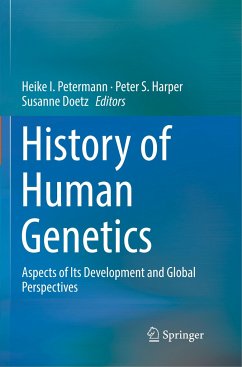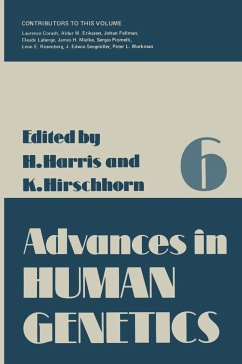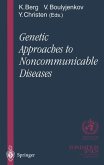History of Human Genetics
Aspects of Its Development and Global Perspectives
Herausgegeben:Petermann, Heike I.; Harper, Peter S.; Doetz, Susanne
History of Human Genetics
Aspects of Its Development and Global Perspectives
Herausgegeben:Petermann, Heike I.; Harper, Peter S.; Doetz, Susanne
- Broschiertes Buch
- Merkliste
- Auf die Merkliste
- Bewerten Bewerten
- Teilen
- Produkt teilen
- Produkterinnerung
- Produkterinnerung
Written by 30 authors from all over the world, this book provides a unique overview of exciting discoveries and surprising developments in human genetics over the last 50 years.
The individual contributions, based on seven international workshops on the history of human genetics, cover a diverse range of topics, including the early years of the discipline, gene mapping and diagnostics. Further, they discuss the status quo of human genetics in different countries and highlight the value of genetic counseling as an important subfield of medical genetics.
![Advances in Human Genetics 15 Advances in Human Genetics 15]() Advances in Human Genetics 1539,99 €
Advances in Human Genetics 1539,99 €![Advances in Human Genetics Advances in Human Genetics]() Kurt HirschhornAdvances in Human Genetics39,99 €
Kurt HirschhornAdvances in Human Genetics39,99 €![Advances in Human Genetics 6 Advances in Human Genetics 6]() Harry HarrisAdvances in Human Genetics 639,99 €
Harry HarrisAdvances in Human Genetics 639,99 €![Advances in Human Genetics 10 Advances in Human Genetics 10]() Harry HarrisAdvances in Human Genetics 1039,99 €
Harry HarrisAdvances in Human Genetics 1039,99 €![Genetic Approaches to Noncommunicable Diseases Genetic Approaches to Noncommunicable Diseases]() Genetic Approaches to Noncommunicable Diseases77,99 €
Genetic Approaches to Noncommunicable Diseases77,99 €![Advances in Human Genetics 14 Advances in Human Genetics 14]() Advances in Human Genetics 1439,99 €
Advances in Human Genetics 1439,99 €![Advances in Human Genetics 21 Advances in Human Genetics 21]() Advances in Human Genetics 2139,99 €
Advances in Human Genetics 2139,99 €-
-
-
The individual contributions, based on seven international workshops on the history of human genetics, cover a diverse range of topics, including the early years of the discipline, gene mapping and diagnostics. Further, they discuss the status quo of human genetics in different countries and highlight the value of genetic counseling as an important subfield of medical genetics.
- Produktdetails
- Verlag: Springer / Springer International Publishing / Springer, Berlin
- Artikelnr. des Verlages: 978-3-319-84739-9
- Softcover reprint of the original 1st ed. 2017
- Seitenzahl: 584
- Erscheinungstermin: 28. Juli 2018
- Englisch
- Abmessung: 235mm x 155mm x 32mm
- Gewicht: 884g
- ISBN-13: 9783319847399
- ISBN-10: 3319847392
- Artikelnr.: 53575669
- Verlag: Springer / Springer International Publishing / Springer, Berlin
- Artikelnr. des Verlages: 978-3-319-84739-9
- Softcover reprint of the original 1st ed. 2017
- Seitenzahl: 584
- Erscheinungstermin: 28. Juli 2018
- Englisch
- Abmessung: 235mm x 155mm x 32mm
- Gewicht: 884g
- ISBN-13: 9783319847399
- ISBN-10: 3319847392
- Artikelnr.: 53575669
Part I Workshops on the History of Human Genetics
The International Workshops on Genetics, Medicine and History:An Overview, 2003-2015Peter S. Harper and Heike I. Petermann
Part II Beginning of Human Genetics
Ancestral Concepts of Human Genetics and Molecular Medicinein Epicurean Philosophy Christos Yapijakis
Bateson and the Doctors: The Introduction of Mendelian Geneticsto the British Medical Community 1900-1910Alan R. Rushton
Part III Genetics and Medicine
Pedigrees and Prejudices: Pre-WWII Inherited Disease Classificationat the US Eugenics Record OfficePhilip K. Wilson
Aldred Scott Warthin's Family 'G': The American Plot Against Cancerand Heredity (1895-1940)Toine Pieters
Genetic Discrimination in the Doctoring of Cancer and Alcoholism Stephen Snelders, Charles D. Kaplan, Frans J. Meijman, and Toine Pieters
The Genomization of Biology: CounterbalancingRadical ReductionismRicardo Noguera-Solano, Rosaura Ruiz-Gutierrez,and Juan Manuel Rodriguez-Caso
A Brief History of Uncertainty in Medical Genetics and Genomics Reed E. Pyeritz
Part IV Countries
"Nature's Laboratories of Human Genetics": Alpine Isolates,Hereditary Diseases and Medical Genetic Fieldwork, 1920-1970Pascal Germann
Some Thoughts on Genetics and Politics. The HistoricalMisrepresentation of Scandinavian Eugenics and SterilizationNils Roll-Hansen
Changing the Point of View: The History of Human Genetics as anApplied Science in the Federal Republic of Germany, 1945-1975Heike I. Petermann
Herbert Bach (1926-1996): One of the Pioneers of Human Geneticsin East Germany (GDR) JEURorg Pittelkow
Concise History of Prenatal Diagnostic Service in RussiaVladislav S. Baranov
Foundation of the International Federation of Human Genetic Societies:The Catalyst Karen Birmingham
Part V Gene Mapping
The First Human Genetic Map 1936Alan R. Rushton
Glasgow Contributions to Human Gene MappingMalcolm A. Ferguson-Smith
Human Gene Mapping: The Mass Media Iconography of the HumanGenome Project in the Most Popular Greek NewspapersConstantinos Morfakis
Part VI Narrated History
National Human Genome Research Institute History of GenomicsOral History Program: An Example of "Triangulation"Christopher Donohue
Narrating Genes: How Patients with Chronic Inflammatory BowelDiseases Interpret an Emerging Disease Aetiology and How We CanMake Sense Out of It by Developing a Historically and SociologicallyInformed FrameworkDana Mahr
Part VII Genetic Counselling
The Establishment of Genetic Counselling in Sweden: 1940-1980Maria BjEURorkman and Anna Tunlid
Counselling, Risk and Prevention in Human Genetic Early Diagnosisin the Federal Republic of GermanyBirgit Nemec and Gabriele Moser
"The Happiness of the Individual Is of Primary Importance":Genetic Counselling in the GDRSusanne Doetz<
Remarks on the History of Genetic Counselling in Czechoslovakia,1945-1990Michal V. Simunek
The Establishment of Human Genetic Counselling in Austria in the1970s in Between the Establishment of Human Genetics and theEugenic Indication of AbortionKatja Geiger and Thomas Mayer
Genetic Counselling in Belgium: The Centre for Human GeneticsGenetic Counselling for Mediterranean Anaemia in Post-war GreeceAlexandra Barmpouti
Karyotyping and the Emergence of Genetic Counselling in Mexicoin the 1960sAna Barahona
Newborn Screening on the Cusp of Genetic Screening: From Solidarityin Public Health to Personal CounsellingMargherita Brusa and Michael Y. Barilan
Feminist Criticism of Genetic Counselling in the Second Halfof the Twentieth CenturyShachar Zuckerman
The Evolving Concept of Non-directiveness in Genetic CounsellingAngus Clarke
A Comparative and Social History of Genetic Counselling?Jean-Paul Gaudilliere
Part I Workshops on the History of Human Genetics
The International Workshops on Genetics, Medicine and History:An Overview, 2003-2015Peter S. Harper and Heike I. Petermann
Part II Beginning of Human Genetics
Ancestral Concepts of Human Genetics and Molecular Medicinein Epicurean Philosophy Christos Yapijakis
Bateson and the Doctors: The Introduction of Mendelian Geneticsto the British Medical Community 1900-1910Alan R. Rushton
Part III Genetics and Medicine
Pedigrees and Prejudices: Pre-WWII Inherited Disease Classificationat the US Eugenics Record OfficePhilip K. Wilson
Aldred Scott Warthin's Family 'G': The American Plot Against Cancerand Heredity (1895-1940)Toine Pieters
Genetic Discrimination in the Doctoring of Cancer and Alcoholism Stephen Snelders, Charles D. Kaplan, Frans J. Meijman, and Toine Pieters
The Genomization of Biology: CounterbalancingRadical ReductionismRicardo Noguera-Solano, Rosaura Ruiz-Gutierrez,and Juan Manuel Rodriguez-Caso
A Brief History of Uncertainty in Medical Genetics and Genomics Reed E. Pyeritz
Part IV Countries
"Nature's Laboratories of Human Genetics": Alpine Isolates,Hereditary Diseases and Medical Genetic Fieldwork, 1920-1970Pascal Germann
Some Thoughts on Genetics and Politics. The HistoricalMisrepresentation of Scandinavian Eugenics and SterilizationNils Roll-Hansen
Changing the Point of View: The History of Human Genetics as anApplied Science in the Federal Republic of Germany, 1945-1975Heike I. Petermann
Herbert Bach (1926-1996): One of the Pioneers of Human Geneticsin East Germany (GDR) JEURorg Pittelkow
Concise History of Prenatal Diagnostic Service in RussiaVladislav S. Baranov
Foundation of the International Federation of Human Genetic Societies:The Catalyst Karen Birmingham
Part V Gene Mapping
The First Human Genetic Map 1936Alan R. Rushton
Glasgow Contributions to Human Gene MappingMalcolm A. Ferguson-Smith
Human Gene Mapping: The Mass Media Iconography of the HumanGenome Project in the Most Popular Greek NewspapersConstantinos Morfakis
Part VI Narrated History
National Human Genome Research Institute History of GenomicsOral History Program: An Example of "Triangulation"Christopher Donohue
Narrating Genes: How Patients with Chronic Inflammatory BowelDiseases Interpret an Emerging Disease Aetiology and How We CanMake Sense Out of It by Developing a Historically and SociologicallyInformed FrameworkDana Mahr
Part VII Genetic Counselling
The Establishment of Genetic Counselling in Sweden: 1940-1980Maria BjEURorkman and Anna Tunlid
Counselling, Risk and Prevention in Human Genetic Early Diagnosisin the Federal Republic of GermanyBirgit Nemec and Gabriele Moser
"The Happiness of the Individual Is of Primary Importance":Genetic Counselling in the GDRSusanne Doetz<
Remarks on the History of Genetic Counselling in Czechoslovakia,1945-1990Michal V. Simunek
The Establishment of Human Genetic Counselling in Austria in the1970s in Between the Establishment of Human Genetics and theEugenic Indication of AbortionKatja Geiger and Thomas Mayer
Genetic Counselling in Belgium: The Centre for Human GeneticsGenetic Counselling for Mediterranean Anaemia in Post-war GreeceAlexandra Barmpouti
Karyotyping and the Emergence of Genetic Counselling in Mexicoin the 1960sAna Barahona
Newborn Screening on the Cusp of Genetic Screening: From Solidarityin Public Health to Personal CounsellingMargherita Brusa and Michael Y. Barilan
Feminist Criticism of Genetic Counselling in the Second Halfof the Twentieth CenturyShachar Zuckerman
The Evolving Concept of Non-directiveness in Genetic CounsellingAngus Clarke
A Comparative and Social History of Genetic Counselling?Jean-Paul Gaudilliere








